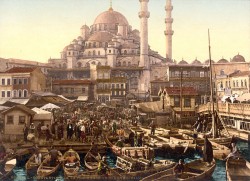Last Word | January 18th, 2016

By Elaine Beitelspacher
In light of recent events I have spent some time educating myself on the history of the Middle East. Needless to say, this is an enormous topic and I don’t pretend to be an expert, but I have learned a few things that I think would be helpful for people to know. To make a very long story short, the history of the Middle East is a history of the rise and fall of empires. There were the Assyrians, the Persians, the Greeks, the Romans and the Ottoman Turks to name a few. It seems just about everyone has tried to rule the Middle East. The Middle East has been a story about imperial ambitions from the very beginning of civilization.
Let’s fast forward to the age of the British Empire and take a look at World War I. Yeah, that war -- the war I never understood. I was told some boring story about Archduke Ferdinand being assassinated and all of Europe going berserk. That made about as much sense to me as the Trojan War being started because Paris absconded with Helen of Troy.
Sometimes you have to dig to find the real story. It turns out that once again, this is a story about empire. Basically England, France, Germany and Russia were vying with each other over who was going to be the great imperial power in the world and they all had their eyes on the weakening Ottoman Empire.
There were of course the natural and human resources that the region had to offer but, more importantly, there was oil. Oil was becoming more important to the increasingly industrialized European nations. Oil was discovered in Persia in 1908. There were reports that perhaps vast amounts of oil could be found throughout the region. Whoever could get their hands on that oil and ship it back home in the most efficient way would be the winner of the race for empire.
The Ottoman Empire, which once encompassed Greece, Serbia, Romania and Bulgaria, was shrinking. After the Balkan War of 1912-13, the Ottomans were out of Europe altogether. Europe was gaining land and influence. At this time, Britain controlled India and had ports around the Arabian Peninsula in order to protect shipping going through the Suez Canal, which had been completed in 1869. They eventually gained control of Egypt and much of the Persian Gulf. The French gained control of Algeria, Tunisia and what is now known as Lebanon and Syria. The Ottomans turned to Germany for help.
Long story short -- the Germans were trying to expand their territory in Europe. The British, French and Russians did not want Germany gaining any more land, power and influence so they made an alliance against Germany. The Ottomans made an alliance with Germany. Russia backed out of WWI early because of the Russian Revolution, so England and France gained control of much of the former Ottoman Empire after World War I. The artificial boundaries that the European powers created did not reflect the historical and cultural realities of the people who lived there.
The Ottomans were having internal struggles as well. The Young Turks took over in 1908 and implemented some reforms including a constitution, parliament and elections. This did not sit well with some people. There were also conflicts between Christians, Muslims, Jews, Turks and Arabs. Internal conflicts were ripe for exploitation by European powers. With the help of a British officer named T.E. Lawrence, better known as Lawrence of Arabia, Sherif Hussein bin Ali led the Arab Revolt against the Ottoman Turks in 1916.
Letters between Sherif Hussein and British High Commissioner Henry McMahon led Hussein to believe that he would be rewarded with an Arab Empire encompassing land between Egypt and Persia if he joined forces with the Allies. Although Hussein’s help was pivotal in giving the British the upper hand in the region, the promises made to him were never fully honored. The British had also made promises to the Zionist Federation of Great Britain and Ireland. In what is known as the Balfour Declaration, the British promised support for a Jewish homeland in Palestine.
This is of course a very short synopsis. It seems that region of the world has never known peace. It’s ironic that 100 years after WWI, the festering infection of that conflict has reached a fever pitch. Significant anniversaries always seem to bring up old wounds. Perhaps these anniversaries are history’s ghosts demanding that we acknowledge and re-examine where we’ve been, in order to see more clearly where we want to go.
June 19th 2025
June 19th 2025
April 27th 2025
April 17th 2025
February 28th 2025
_(1)__293px-wide.jpg)




